Cite this document
(“Tax Avoidance by the use of Tax Haven Jurisidication: A Corporate Dissertation”, n.d.)
Retrieved from https://studentshare.org/other/1427525-tax-avoidance-by-the-use-of-tax-haven-jurisidication-a-corporate-governance-issue
Retrieved from https://studentshare.org/other/1427525-tax-avoidance-by-the-use-of-tax-haven-jurisidication-a-corporate-governance-issue
(Tax Avoidance by the Use of Tax Haven Jurisidication: A Corporate Dissertation)
https://studentshare.org/other/1427525-tax-avoidance-by-the-use-of-tax-haven-jurisidication-a-corporate-governance-issue.
https://studentshare.org/other/1427525-tax-avoidance-by-the-use-of-tax-haven-jurisidication-a-corporate-governance-issue.
“Tax Avoidance by the Use of Tax Haven Jurisidication: A Corporate Dissertation”, n.d. https://studentshare.org/other/1427525-tax-avoidance-by-the-use-of-tax-haven-jurisidication-a-corporate-governance-issue.


